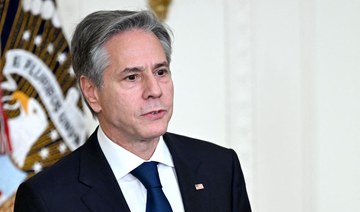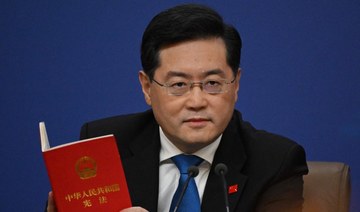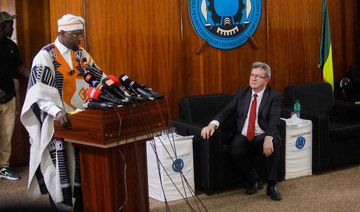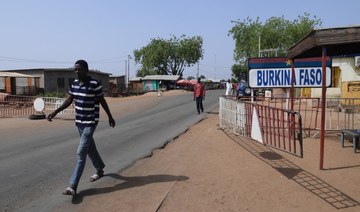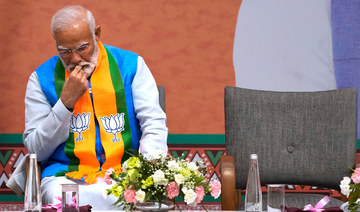BEIJING: US Secretary of State Antony Blinken on Sunday kicked off two days of high-stakes diplomatic talks in Beijing aimed at trying to cool exploding US-China tensions that have set many around the world on edge.
Blinken opened his program by meeting Chinese Foreign Minister Qin Gang for an extended discussion to be followed by a working dinner. He'll have additional talks with Qin, as well as China's top diplomat Wang Yi and possibly President Xi Jinping, on Monday.
Neither Blinken nor Qin made any substantive comments to reporters as they began the meeting at the Diaoyutai State Guesthouse.
Despite Blinken's presence in the Chinese capital, prospects for any significant breakthroughs are slim, as already strained ties have grown increasingly fraught in recent years. Animosity and recriminations have steadily escalated over a series of disagreements that have implications for global security and stability.
Blinken is the highest-level American official to visit China since President Joe Biden took office and the first secretary of state to make the trip in five years.
Biden and Xi agreed to Blinken’s trip early at a meeting last year in Bali. It came within a day of happening in February but was delayed by the diplomatic and political tumult brought on by the discovery of what the U.S. says was a Chinese spy balloon flying across the United States that was shot down.
The list of disagreements and potential conflict points is long, ranging from trade with Taiwan, human rights conditions in China and Hong Kong to Chinese military assertiveness in the South China Sea and Russia's war in Ukraine.
Blinken will also be pressing the Chinese to release detained American citizens and to take steps to curb the production and export of fentanyl precursors that are fueling the opioid crisis in the United States.
U.S. officials have said Blinken will raise each of these points, though neither side has shown any inclination to back down on their entrenched positions.
Shortly before leaving, Blinken emphasized the importance of the US and China establishing and maintaining better lines of communication. The US wants to make sure “that the competition we have with China doesn’t veer into conflict” due to avoidable misunderstandings, he told reporters.
Biden and Xi had made commitments to improve communications “precisely so that we can make sure we are communicating as clearly as possible to avoid possible misunderstandings and miscommunications,” Blinken said Friday.
Xi offered a hint of a possible willingness to reduce tensions, saying in a meeting with Microsoft Corp. co-founder Bill Gates on Friday that the United States and China can cooperate to “benefit our two countries."
“I believe that the foundation of Sino-U.S. relations lies in the people,” Xi said to Gates. “Under the current world situation, we can carry out various activities that benefit our two countries, the people of our countries, and the entire human race.”
Biden told White House reporters Saturday he was “hoping that over the next several months, I'll be meeting with Xi again and talking about legitimate differences we have, but also how ... to get along.”
Chances for such a meeting could come at a Group of 20 leaders' gathering in September in New Delhi and at the Asia-Pacific Economic Cooperation summit in November in San Francisco that the United States is hosting.
Since the cancellation of Blinken's trip in February, there have been some high-level engagements. CIA chief William Burns traveled to China in May, while China’s commerce minister traveled to the U.S. And Biden’s national security adviser Jake Sullivan met with Wang in Vienna in May.
But those have been punctuated by bursts of angry rhetoric from both sides over the Taiwan Strait, their broader intentions in the Indo-Pacific, China’s refusal to condemn Russia for its war against Ukraine, and U.S. allegations from Washington that Beijing is attempting to boost its worldwide surveillance capabilities, including in Cuba.
And, earlier this month, China’s defense minister rebuffed a request from US Defense Secretary Lloyd Austin for a meeting on the sidelines of a security symposium in Singapore, a sign of continuing discontent.
Austin said Friday he was confident that he and his Chinese counterpart would meet “at some point in time, but we’re not there yet.”
Underscoring the difficulties, China rejected a report by a US security firm, that blamed Chinese-linked hackers for attacks on hundreds of public agencies, schools and other targets around the world, as “far-fetched and unprofessional”
A Chinese foreign ministry spokesperson repeated accusations that Washington carries out hacking attacks and complained the cybersecurity industry rarely reports on them.
That followed a similar retort earlier in the week when China said Qin had in a phone call with Blinken urged the United States to respect “China’s core concerns” such as the issue of Taiwan’s self-rule, “stop interfering in China’s internal affairs, and stop harming China’s sovereignty, security and development interests in the name of competition.”
Meanwhile, the national security advisers of the United States, Japan and the Philippines held their first joint talks Friday and agreed to strengthen their defense cooperation, in part to counter China's growing influence and ambitions.
This coincides with the Biden administration inking an agreement with Australia and Britain to provide the first with nuclear-powered submarines, with China moving rapidly to expand its diplomatic presence, especially in the Indian Ocean and the Pacific island nations, where it has opened or has plans to open at least five new embassies over the next year.
The agreement is part of an 18-month-old nuclear partnership given the acronym AUKUS — for Australia, the United Kingdom and the United States.
Speaking ahead of Blinken's arrival, two US officials downplayed hopes for major progress and stressed that the trip was intended to restore a sense of calm and normalcy to high-level contacts.
"We’re coming to Beijing with a realistic, confident approach and a sincere desire to manage our competition in the most responsible way possible,” said Daniel Kritenbrink, the top US diplomat for East Asia and the Pacific.
Kurt Campbell, the top Asia expert at the National Security Council, said "intense competition requires intense diplomacy if we’re going to manage tensions. That is the only way to clear up misperceptions, to signal, to communicate, and to work together where and when our interests align.”
Blinken kicks off meetings in Beijing on high-stakes mission to cool soaring US-China tensions
https://arab.news/b7tdc
Blinken kicks off meetings in Beijing on high-stakes mission to cool soaring US-China tensions

- Blinken opened his program by meeting Chinese Foreign Minister Qin Gang for an extended discussion to be followed by a working dinner
- Blinken is the highest-level American official to visit China since President Joe Biden took office and the first secretary of state to make the trip in five years
Senegal’s new president welcomes challenge to help reconcile ECOWAS with Mali, Burkina Faso, and Niger

- Ghana’s President Akufo-Addo sought Bassirou Diomaye Faye's help during their meeting in Accra on Friday
- Faye said that he hoped to convince the countries to “come back and share our common democratic values and what we stand for”
ACCRA: Ghana’s president Friday urged his visiting Senegalese counterpart to use his goodwill within the Economic Community of West African States to help resolve disputes with Niger, Burkina Faso and Mali.
President Bassirou Diomaye Faye arrived in the capital Accra early in the morning after visiting Nigeria’s President Bola Ahmed Tinubu.
Niger, Mali and Burkina Faso in January 2024 announced they were leaving ECOWAS after they were suspended by the group over military coups in all three nations.
“We are lucky to have a new leader in place because I think he is also going to help us to try and resolve the big problem that we have in the ECOWAS community,” Ghana’s President Nana Akufo-Addo said after meeting Faye.
“President Faye is very committed to seeing what he and the rest of us can do to reach out and revive the dialogue.”
Speaking to reporters after bilateral talks, Akufo-Addo said Faye had demonstrated commitment to ECOWAS efforts to bring the three countries to the table for further talks and back to the bloc.
Faye, 44, won a resounding victory as an anti-establishment candidate promising major reforms to become Senegal’s youngest-ever president.
His election has been seen as an inspiration for change in contrast to some of the continent’s aging leaders who have been in power for years and to other countries now run by military governments.
He welcomed the challenge to help reconcile ECOWAS with Mali, Burkina Faso, and Niger.
ECOWAS “is going through difficult times but we are going to do all we can to consolidate the gains made in integration, in a spirit of common, fraternal solidarity,” Faye told reporters.
Unity was “primordial” in the region, he added.
Earlier in Nigeria, Faye said that alongside Nigeria, which currently chairs ECOWAS, he hoped to convince the countries to “come back and share our common democratic values and what we stand for.”
Nancy Pelosi’s husband’s attacker jailed for 30 years

SAN FRANCISCO: A man who attacked the elderly husband of former US House Speaker Nancy Pelosi with a hammer was sentenced Friday to 30 years in prison.
David DePape was convicted last year of breaking into the couple’s San Francisco home and bludgeoning Paul Pelosi in a horrifying attack captured on police bodycam.
At the time of the October 2022 assault, Democrat Nancy Pelosi was second in line to the presidency and a regular target of outlandish far-right conspiracy theories.
Jurors in his trial last year heard how DePape — a Canadian former nudist activist who supported himself with occasional carpentry work — had initially planned to target Nancy Pelosi, planning to smash her kneecaps if she did not admit to her party’s “lies.”
On arriving at their home armed with rope, gloves and duct tape, DePape instead encountered her then-82-year-old husband, and kept asking, “Where’s Nancy?“
During what DePape told officers was a “pretty amicable” conversation with Paul Pelosi, the husband managed to call for help from law enforcement officers.
Moments later when police arrived DePape hit Pelosi with a hammer before officers rushed at him and took the weapon away.
Pelosi was knocked unconscious and had his skull fractured. He spent almost a week in a hospital, where he underwent surgery.
Nancy Pelosi was not at home the night of the attack.
Prosecutors had asked the federal court in San Francisco to sentence DePape to 40 years in prison.
In the lead up to Friday’s sentencing, Nancy Pelosi had asked the judge to impose a “very long” sentence for an attack that “has had a devastating effect on three generations of our family.”
“Even now, eighteen months after the home invasion and assault, the signs of blood and break-in are impossible to avoid.
“Our home remains a heartbreaking crime scene,” she wrote, according to court documents cited by the San Francisco Chronicle.
On Friday her office said the family was proud of Paul Pelosi “and his tremendous courage in saving his own life on the night of the attack and in testifying in this case.”
DePape had pleaded not guilty to charges that included assault on a family member of a US official, and attempted kidnapping of a US official.
While not denying the attack, his defense rested on contesting federal prosecutors’ claims that he had targeted Nancy Pelosi in her official capacity.
Instead, his lawyers argued that DePape was driven to target a number of prominent liberal figures, due to his exposure to a web of obscure conspiracy theories.
In social media posts, DePape shared QAnon theories and false claims that the last US election was stolen.
The trial heard how DePape did not intend to stop his supposed anti-corruption crusade with Pelosi, and had drawn up a list of other targets including a feminist academic whom he accused of turning US schools into “pedophile molestation factories.”
Other personalities the defendant admitted wanting to attack included California Governor Gavin Newsom, President Joe Biden’s son Hunter, and actor Tom Hanks.
Jurors took less than 10 hours to reject DePape’s explanation of the attack, which took place just a few days before the US midterm elections.
The attack itself became politicized in the weeks after it occurred, with some members of the Republican Party mocking the incident and suggesting lurid and unsubstantiated explanations for why there was a man in Pelosi’s house late at night.
US Attorney General Merrick Garland said Friday that DePape’s sentence should serve as a warning that attacks on political figures and their families were unacceptable.
“In a democracy, people vote, argue, and debate to achieve the policy outcome they desire,” he said.
“But the promise of democracy is that people will not employ violence to affect that outcome.
“The Justice Department will aggressively prosecute those who target public servants and their families with violence.”
Burkina loyalists rally after gunfire near presidency

- Burkina Faso news agency AIB reported that an individual had tried to attack a guard at the palace but there were no injuries or damage
- Junta leader Traore seized power in a coup on September 30, 2022, deposing a military regime that earlier ousted the elected president Roch Marc Christian Kabore
OUAGADOUGOU, Burkina Faso: Hundreds of demonstrators rallied in Burkina Faso’s capital Friday in support of the country’s military rulers after gunfire was reported near the presidency, AFP reporters said.
Demonstrators gathered at a roundabout in central Ouagadougou, vowing to protect the rule of President Ibrahim Traore.
Earlier in the afternoon, “there were shots fired near the presidential palace,” said one demonstrator, Moussa Sawadogo.
“We do not know what is going on but we are there to stop anything from happening.”
Burkina Faso news agency AIB reported that an individual had tried to attack a guard at the palace but there were no injuries or damage.
Security forces closed off access to the area around the palace, AFP reporters saw.
The landlocked West African nation has been run by a military regime since mutinying soldiers deposed elected president Roch Marc Christian Kabore in 2022.
Junta leader Traore then seized power in another coup on September 30, 2022.
He established a transitional government and legislative assembly for 21 months, a period set to expire on July 1.
National consultations on the next steps in the transition to civilian rule are scheduled for May 25 to 26.
Since 2015, Burkina’s forces have been struggling to combat jihadist insurgencies that have killed thousands of people and forced around two million from their homes — violence that the army’s leaders used to justify their coups.
Zelensky rejects Olympic truce call, saying it could help Russia

- Zelensky said he had spoken to French President Emmanuel Macron who made the appeal told him Russian President Putin cannot be trusted
- Putin earlier on Friday also suggested that Moscow would not support the idea of a truce during the games in Paris this summer
KYIV: Ukrainian President Volodymyr Zelensky in an interview with AFP on Friday rejected a French call for an Olympic truce this summer, saying it could just help Russia move its troops and equipment.
In an interview with AFP on Friday, Zelensky said he had spoken to French President Emmanuel Macron who made the appeal and told him: “Let’s be honest... Emmanuel, I don’t believe it.”
“Who can guarantee that Russia will not use this time to bring its forces to our territory?” Zelensky said, adding: “First of all, we don’t trust Putin.”
“We are against any truce that plays into the hands of the enemy,” he said.
“If it’s a truce, an Olympic truce for the duration of the Olympics, a land truce, they will have an advantage,” he said, explaining that there was “a risk that they will bring heavy equipment to our territory and no one will be able to stop them.”
Russian President Vladimir Putin earlier on Friday also suggested that Moscow would not support the idea of a truce during the games in Paris this summer.
Asked during a visit to China whether he backed Macron’s idea, Putin said: “I think these Olympic principles, including the ‘Olympic truce’ are very right.”
But he added: “Today’s international sporting officials are themselves disobeying the principles of the Olympic charter.”
He accused sports bodies of “not allowing our athletes to perform at the games with our banner, flag and our national music, our anthem.”
“They are committing violations against us and demand fulfilment from us. Dear friends: we won’t get far that way. No one has ever come to an agreement that way,” Putin said.
Macron had restated on Friday his idea of “an Olympic truce so that Russia ceases its current operations” in Ukraine.
Macron also thanked Chinese President Xi Jinping last week for backing the idea of a truce in all conflicts, including Ukraine, during the Paris Olympics.
Only 25 percent of needed air defense
Zelensky also said his country needed over a hundred aircraft to counter Russian air power and said Ukraine only had a quarter of the air defenses it needs.
His country has faced a surge of devastating attacks as the war stretches into its third year, leading Kyiv to double down on pleas to strengthen its depleted air defenses.
“Today we have about 25 percent of what we need to defend Ukraine. I’m talking about air defense,” Zelensky said.
Russia currently holds an advantage in the air, which limits Ukraine’s ability to protect cities and hold the front line.
To combat sustained aerial and ground assaults, Ukrainian officials have called for more support.
“So that Russia does not have air superiority, our fleet should have 120 to 130 modern aircraft... to defend the sky against three hundred (Russian) aircraft,” Zelensky said.
He also said the fighter jets were needed “to have parity” with Russia.
His comments came just weeks after the US Congress finally approved a $61-billion financial aid package for Ukraine following months of political wrangling.
Zelensky called for some of the assistance to be delivered.
“Can we have three (billion) to get two (Patriot) systems in Kharkiv region, and no bombs will fall on the heads of the military,” he said.
Out on bail, firebrand Indian politician poses fresh challenge for Modi

- Kejriwal’s Aam Aadmi Party is in power in the Delhi region and in the northern state of Punjab, which together account for just 20 seats in parliament, out of the 543 being contested
NEW DELHI: Firebrand Indian politician Arvind Kejriwal has hit the ground running since his surprise release from detention in the midst of a contentious general election, energizing the opposition as it challenges Prime Minister Narendra Modi.
The Supreme Court gave 55-year-old Kejriwal, who is also the chief minister of the national capital territory of Delhi, bail in a graft case on May 10 and he wasted no time in getting on the campaign trail.
“I have only one request from you; we all have to come together to save the country from dictatorship. I am fighting this dictatorship with all my might,” he told a jubilant crowd soon after walking out of Delhi’s Tihar jail, clearly referring to Modi.
HIGHLIGHTS
• Delhi voters have mixed reactions to his campaign.
• Kejriwal will generate sympathy but victory unsure, analysts say.
Kejriwal is part of the INDIA alliance led by the Congress Party and one of its biggest crowd-pullers. Analysts say while his campaigning will give fresh impetus to the opposition, they are unsure if that will translate into any significant victories against the ruling Bharatiya Janata Party, which is tipped to return to power.
Kejriwal’s Aam Aadmi Party is in power in the Delhi region and in the northern state of Punjab, which together account for just 20 seats in parliament, out of the 543 being contested.
“He may be able to generate some sympathy vote, but would that be enough to change the outcome of the election?” said Rahul Verma, a fellow at the New Delhi-based Center for Policy Research think tank.
“The BJP led in Delhi by 20 percentage points on an average in each seat, so it needs a substantial amount of swing for BJP to start losing seats in Delhi,” Verma added.
Still, Kejriwal has the ability to embarrass the BJP.
A day after his release, he said Modi, central to the ruling party’s campaign, would not be prime minister beyond 2025 when he turns 75, and would hand over the reins to Home (Interior) Minister Amit Shah.
“Modi made the rule in BJP that whoever turns 75 will be retired. So I ask BJP, who will be your prime minister?” Kejriwal said. “Modi is not seeking for votes for himself, but for Amit Shah...who will fulfil Modi’s guarantees then?“
The BJP scrambled to deny the suggestion that flag-bearer Modi would retire.
ANTI-GRAFT CRUSADER
India began voting on April 19 in the seven-phase election in which Modi, 73, is seeking to be the second prime minister to win a third straight term since independence leader Jawaharlal Nehru.
Delhi goes to the polls on May 25 and Punjab on June 1. Results are due on June 4.
Kejriwal is an anti-corruption crusader-turned-politician with a reputation of being a street-fighter. He projects himself as a messiah of the working class through AAP’s focus on health care, schools and subsidies, and has a high profile image in the media, allowing him to punch above his weight, analysts say.
The Enforcement Directorate, India’s financial crime-fighting agency, arrested him on March 21 in connection with corruption allegations related to the capital territory’s liquor policy.
Kejriwal has dismissed the graft allegations against him as an attempt by Modi’s government to destroy his party and damage the opposition. Modi and the BJP have denied the charges.
Delhi’s voters had mixed reactions to his campaign.
“Giving bail to Kejriwal is like adding fuel to the fire (for the opposition),” said Irshad, 35, a barber in Delhi’s Jahangirpuri area, who gave only his first name. “He’s a genuine leader.”
In the Model Town locality of the capital, vegetable vendor Surya Bali, 33, asked: “If he was not corrupt, why would they send him to jail?“
Some were undecided who they would vote for, including Madhuri Akshay Rajput, 30, a tailor in another part of the city. “Whether Kejriwal has done something wrong or not, going to jail dents your image,” she said. “What’s the point of voting? Nothing has changed.”




